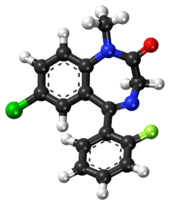Fludiazepam
 | |
 | |
| Clinical data | |
|---|---|
| Trade names | Erispan (JP, TW) |
| AHFS/Drugs.com | International Drug Names |
| Routes of administration | Oral (tablets) |
| ATC code | N05BA17 (WHO) |
| Legal status | |
| Legal status |
|
| Pharmacokinetic data | |
| Metabolism | Hepatic |
| Excretion | Renal |
| Identifiers | |
| |
| CAS Number |
3900-31-0 |
| PubChem (CID) | 3369 |
| DrugBank |
DB01567 |
| ChemSpider |
3252 |
| UNII |
7F64A2K16Z |
| KEGG |
D01354 |
| ChEBI |
CHEBI:31618 |
| ChEMBL |
CHEMBL13291 |
| Chemical and physical data | |
| Formula | C16H12ClFN2O |
| Molar mass | 302.7 |
| 3D model (Jmol) | Interactive image |
| |
| |
| (verify) | |
Fludiazepam, marketed under the brand name Erispan (エリスパン)[1][2] is a potent benzodiazepine and 2ʹ-fluoro derivative of diazepam,[3] originally developed by Hoffman-La Roche in the 1960s.[4] It is marketed in Japan and Taiwan. It exerts its pharmacological properties via enhancement of GABAergic inhibition.[5] Fludiazepam has 4 times more binding affinity for benzodiazepine receptors than diazepam.[6] It possesses anxiolytic,[7][8][9] anticonvulsant, sedative, hypnotic and skeletal muscle relaxant properties.[10]
As with all benzodiazepines, fludiazepam is used recreationally.[11]
See also
- Benzodiazepine
- Diazepam
- Diclazepam (the 2ʹ-chloro-analog)
- Flunitrazepam (the 7-nitro-analog)
References
- ↑ Su, TP.; Chen, TJ.; Hwang, SJ.; Chou, LF.; Fan, AP.; Chen, YC. (Aug 2002). "Utilization of psychotropic drugs in Taiwan: an overview of outpatient sector in 2000.". Zhonghua Yi Xue Za Zhi (Taipei). 65 (8): 378–91. PMID 12455808.
- ↑ "Benzodiazepine Names". non-benzodiazepines.org.uk. Retrieved 2008-12-29.
- ↑ Neville, GA.; Beckstead, HD.; Shurvell, HF. (Feb 1994). "A Fourier transform-Raman and infrared vibrational study of delorazepam, fludiazepam, flurazepam, and tetrazepam.". J Pharm Sci. 83 (2): 143–51. doi:10.1002/jps.2600830207. PMID 7909552.
- ↑ US Patent 3299053 -ARYL-JH-L,X-BENZODIAZEPIN-Z(LH)-ONES
- ↑ Tsuchiya, T.; Fukushima, H. (Apr 1978). "Effects of benzodiazepines and pentobarbitone on the gaba-ergic recurrent inhibition of hippocampal neurons.". Eur J Pharmacol. 48 (4): 421–4. doi:10.1016/0014-2999(78)90169-3. PMID 648585.
- ↑ Nakatsuka, I.; Shimizu, H.; Asami, Y.; Katoh, T.; Hirose, A.; Yoshitake, A. (Jan 1985). "Benzodiazepines and their metabolites: relationship between binding affinity to the benzodiazepine receptor and pharmacological activity.". Life Sci. 36 (2): 113–9. doi:10.1016/0024-3205(85)90089-X. PMID 2857046.
- ↑ Okada, S.; Ichiki, K.; Tanokuchi, S.; Ishii, K.; Hamada, H.; Ota, Z. (1994). "Effect of an anxiolytic on lipid profile in non-insulin-dependent diabetes mellitus.". J Int Med Res. 22 (6): 338–42. PMID 7895897.
- ↑ Okada, S.; Ichiki, K.; Tanokuchi, S.; Ishii, K.; Hamada, H.; Ota, Z. (1995). "Improvement of stress reduces glycosylated haemoglobin levels in patients with type 2 diabetes.". J Int Med Res. 23 (2): 119–22. PMID 7601294.
- ↑ Okada, S.; Ichiki, K.; Tanokuchi, S.; Ishii, K.; Hamada, H.; Ota, Z. (1995). "How blood pressure in patients with non-insulin-dependent diabetes mellitus is influenced by stress.". J Int Med Res. 23 (5): 377–80. PMID 8529781.
- ↑ Inoue, H.; Maeno, Y.; Iwasa, M.; Matoba, R.; Nagao, M. (Sep 2000). "Screening and determination of benzodiazepines in whole blood using solid-phase extraction and gas chromatography/mass spectrometry.". Forensic Sci Int. 113 (1-3): 367–73. doi:10.1016/S0379-0738(00)00226-7. PMID 10978650.
- ↑ Shimamine, M.; Masunari, T.; Nakahara, Y. (1993). "[Studies on identification of drugs of abuse by diode array detection. I. Screening-test and identification of benzodiazepines by HPLC-DAD with ICOS software system]". Eisei Shikenjo Hokoku (111): 47–56. PMID 7920567.
External links
- (Japanese) "エリスパンフルジアゼパム錠0.25mg,細粒0.1% Erispan (fludiazepam tablets 0.25 mg, fine granules 0.1%) Prescribing Information." (PDF). Sumitomo Dainippon Pharma.
- (Japanese) Official Dainippon Sumitomo Pharma Website
This article is issued from Wikipedia - version of the 4/2/2016. The text is available under the Creative Commons Attribution/Share Alike but additional terms may apply for the media files.